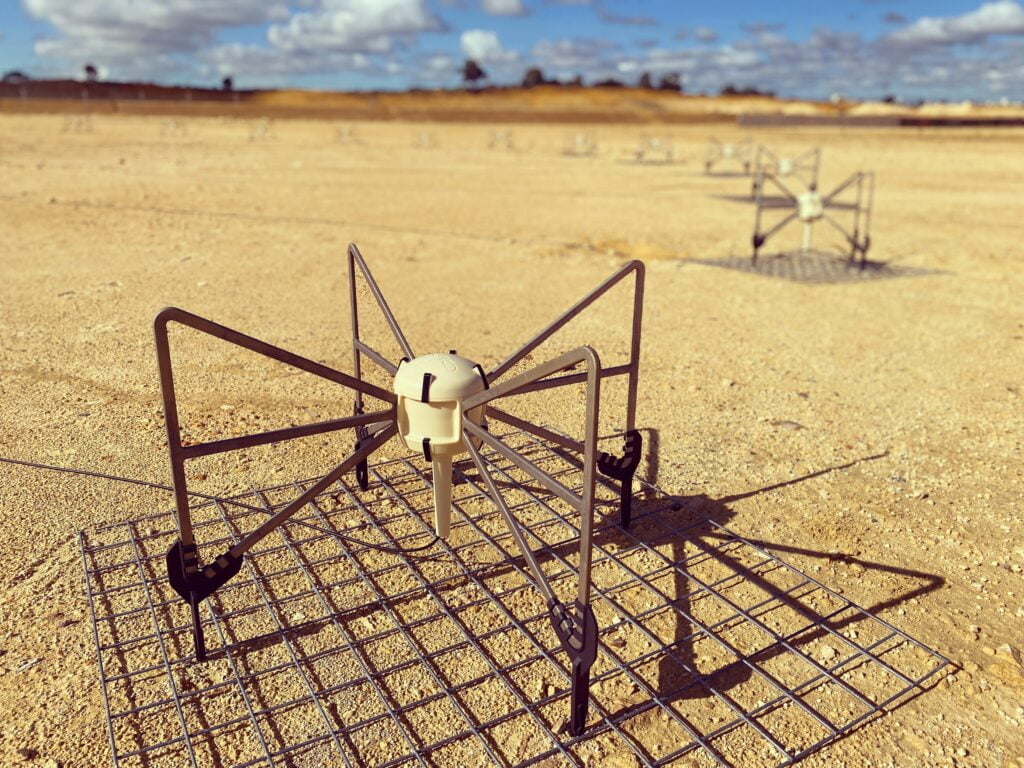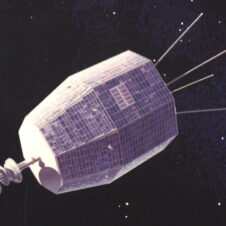Researchers from the International Centre for Radio Astronomy Research (ICRAR) have developed a low cost, portable sensor system which can be used to detect space junk, satellites, and aircraft.
The portable Space Domain Awareness (SDA) project is part of a Collaborative Research Grant funded by the Government of Western Australia’s Defence Science Centre. Developed by researchers from ICRAR’s Curtin University node, the SDA project translates the technologies used in radio astronomy to create an inexpensive, flexible, and portable passive radar system.
Unlike conventional radar systems, which deliberately transmit a known signal, a passive radar system makes use of third-party transmissions such as broadcast radio and TV signals to detect objects without revealing its own existence.

The portable Space Domain Awareness system uses transmissions in the local environment to detect objects. Credit: ICRAR-Curtin
Associate Professor Randall Wayth from ICRAR-Curtin is the project’s lead researcher and says the 32-antenna system could be configured for several different applications.
“Our system is highly portable, sensitive, and invisible to many typical or commercial detection systems, making it ideal for deployment in remote environments and Defence scenarios,” said Associate Professor Wayth.
ICRAR researchers prototyped their portable sensor system based on existing radio astronomy technology, demonstrating its use for covert surveillance that can be operated stand-alone or integrated into a wider network.
“In building this prototype, ICRAR has taken technologies and expertise developed in the course of our core business of radio astronomy, and applied them to a Defence purpose,” said Associate Professor Wayth.
“The techniques we use to image the distant Universe translate directly to detecting objects closer to home.”

The Portable Space Domain Awareness (SDA) system leverages technology from radio astronomy. Credit: ICRAR-Curtin
A key consideration for the project was to motivate and stimulate the development of a Western Australian manufacturing supply chain for critical components. To achieve this, the project leveraged ICRAR’s strong connections with Western Australia’s engineering and manufacturing industries to respond to Defence’s current and emerging capability needs. This demonstrated ICRAR’s support for local jobs and WA’s manufacturing industry.
The project has provided stepping stones toward a larger, fixed, and dedicated SDA facility to be built and operated in partnership with Nova Systems. Construction has commenced at Nova’s Peterborough site in South Australia, using a receiver system based on the design, development, and testing of the portable SDA system.
The research team worked with the WA Government’s Development WA, to deploy the portable SDA system to the Australian Automation and Robotics Precinct (AARP) at Neerabup. This arrangement raised awareness of the state’s research and development capabilities in the field of SDA and provided a showcase for WA Government facilities designed to support research and development.
Looking to the future, Associate Professor Wayth says discussions with collaborators from industry and government are ongoing, with the aim of achieving real-time data processing capability, improving the potential for application to various Defence and security challenges.
This research was supported by the Defence Science Centre, an initiative of the State Government of Western Australia.
ENDS
ABOUT ICRAR
The International Centre for Radio Astronomy Research (ICRAR) was founded in 2009 to support Australia’s bid to host the world’s largest radio telescope, the Square Kilometre Array, representing one of the largest scientific endeavours in history.
Constituting a joint venture between Curtin University and the University of Western Australia, and proudly supported by the Government of Western Australia, ICRAR has grown into an internationally renowned, multi-disciplinary research centre for science, engineering, and data intensive astronomy, and is one of the top 5 astronomy centres in the world.
Our prize-winning team of 135 researchers from more than 32 countries includes an ARC Laureate Fellow, several ARC Future Fellows, and several Forrest Fellows.
Our Translation and Impact team works closely with industry, government, and communities to share our wealth of expertise and to help business grow.
More than half of ICRAR projects involve partnerships with international research institutions, and approximately 300 scientific papers are published annually in prestigious peer reviewed journals.
To learn more, visit icrar.org
ABOUT CURTIN UNIVERSITY
Curtin University is Western Australia’s largest university, with close to 60,000 students. In addition to the University’s main campus in Perth, Curtin also has a major regional campus in Kalgoorlie, and a campus in Midland, as well as four global campuses in Malaysia, Singapore, Dubai and Mauritius. Curtin staff and students come from Australia and over 120 other countries around the world, with half our international students studying at Curtin’s offshore campuses.
Curtin is ranked in the top one per cent of universities worldwide, with the University placed 9th in Australia according to the Academic Ranking of World Universities (ARWU) 2022 and has achieved a QS Five Stars Plus rating, the highest available for a tertiary institution, and one of only five to do so in Australia.
The University has built a reputation around innovation and an entrepreneurial spirit, being at the forefront of many high-profile research projects in astronomy, biosciences, economics, mining and information technology. It is also recognised globally for its strong connections with industry, and for its commitment to preparing students for the jobs of the future.
For further information, visit curtin.edu.au
ABOUT THE DEFENCE SCIENCE CENTRE
The Defence Science Centre creates connections across universities, industries, and Defence to develop Western Australia’s science and research capabilities.
For further information, visit their website.
CONTACTS
ICRAR
Sharon Segler, Manager Strategic Engagement and Communications
0409 202 255
Sharon.segler@icrar.org
CURTIN UNIVERSITY
Lucien Wilkinson, Media Relations
0401 103 683
lucien.wilkinson@curtin.edu.au
DEFENCE SCIENCE CENTRE
Aliesha Lavers, Media Manager
0400 812 869
Aliesha.Lavers@jtsi.wa.gov.au

